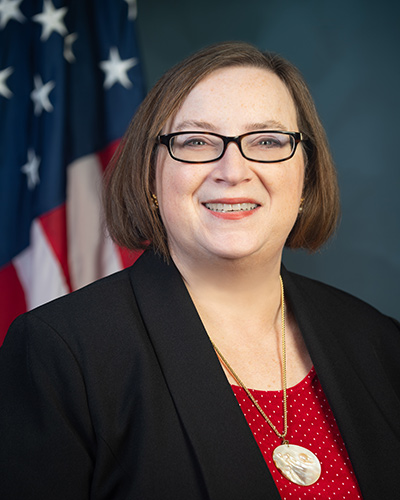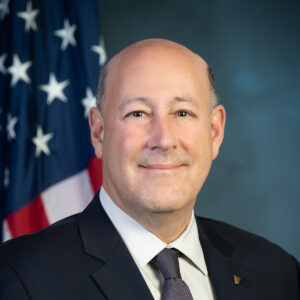Federal Housing Administration (FHA) Commissioner Julia Gordon and David Berenbaum, deputy assistant secretary for the Office of Housing Counseling at the U.S. Department of Housing and Urban Development (HUD), returned to this year’s National Reverse Mortgage Lenders Association (NRMLA) Annual Meeting and Expo in San Diego.
Both leaders were in a reflective state of mind. They looked back at what has been accomplished over the course of the Biden-Harris administration as it relates to overseeing HUD and FHA lending programs, along with expanding the availability of housing counseling services.
In a sit-down interview with HousingWire’s Reverse Mortgage Daily (RMD) conducted on-site at the event, Gordon and Berenbaum spoke about the reverse mortgage program’s impacts on their responsibilities.
‘We need to house a lot more people’
When asked about how her perspectives on the Home Equity Conversion Mortgage (HECM) program have evolved over time, Gordon spoke about its market authority relative to other HUD and FHA programs, and how the elevated interest rate environment has impacted the work and mission of HUD.

“In all of lending right now, we have been affected by the rate environment, and that’s hit every sector,” Gordon said. “Volumes are down across all of our portfolio, which is to be expected and is not alarming in a risk sense. It is, of course, alarming because our country has an affordable housing crisis, and we need to house a lot more people.”
That, she says, is HUD’s reason for being, but that comes with a necessary realization that these programs exist in a larger macroeconomic environment. Rates will move up or down, and other headwinds — like pandemics or financial crises — will emerge.
“So, I think it’s less important to compare HECM against other products than it is to think about what the health of the HECM sector is right now,” she said. “How are reverse mortgages being deployed in [and] accepted by the marketplace, and how are they sold into the secondary market?”
Determining how well these systems are working and whether or not there is sufficient liquidity in the sector, are the questions HUD has been most focused on. But there are also instances where she believes HUD, FHA and Ginnie Mae have risen to the challenge.
“At FHA and Ginnie Mae, we’ve tried to make changes or improvements to try to address those challenges,” she said. “By and large, I think the policy changes and adjustments of the past two years have been remarkably successful.”
With a lot of the attention having been on the secondary market since the end of 2022, Gordon added that the focus is likely to return to the origination side, “and how we attract new customers into this product, [while making it] it as safe and effective and useful a product as it possibly can be.”
Greasing the ‘squeaky wheel’
Gordon previously spoke about the relative ease she has had working with the reverse mortgage industry. When asked about whether or not that’s derived from the passion of its stakeholders, Gordon pointed out that the adage of the “squeaky wheel gets the grease” may not apply to her role in a traditional sense.
“As the assistant secretary for housing, there are dozens of wheels squeaking every single day,” she said through a laugh. “It’s just a cacophony of squeaking wheels. But I’ll repeat something I said on the stage, which is that when I leave and people look back on what Commissioner Gordon’s period of time here had as its hallmarks, I hope one of those is that we were open, transparent and responsive to suggestions and feedback.”
HUD and FHA are believers in continuous improvement to the programs they oversee. Gordon said they emphasize the importance of listening to active industry members — “our eyes and ears out in the field” — when developing responses.
“I am grateful in all of the areas I work to have had people in the industry or in the consumer advocacy community who know to reach out to us, and tell us what they’re seeing in all of these areas,” she said. “But this is true in HECM as well. We have sometimes heard something from the field that we really didn’t know about, and then we can say, ‘We can do something about that.’ So, it’s not really about who yells the loudest; it’s who brings us actionable items.”

This also carries over to the counseling side of the equation, Berenbaum said.
“I think the Office of Housing Counseling has been focused on who our consumer is, and in this case, it is elders and seniors across the country,” he said.
“Most recently, the final issuance of the modernization rule is going to be helping elders across the country engage with housing counselors in the way that they feel most comfortable, whether it’s in person, telephonically, or more and more elders using Zoom or Microsoft Teams or other tools to engage with other certified housing counselors.”
Industry and consumer feedback has also helped the office ensure it remains focused on meeting seniors’ growing needs, he explained. This is particularly true as aging in place gains both popularity and prominence in the choices that older Americans are making in later life.
Seniors’ needs grow more acute
“Unfortunately, as was pointed out by our commissioner, there’s a horrible shortage of rental housing that’s affordable to elders,” Berenbaum said. “The idea of moving into rental housing after living in your home, it’s often more costly to live in that rental housing today than to stay and age in place in the home.”
This represents an argument for a healthy reverse mortgage marketplace with strength in both counseling flexibilities and available product options, he said. The need for a strong HECM market only escalates when considering that seniors are becoming the fastest-growing group of unhoused individuals in the nation.
“It started during the pandemic and has just continued to grow,” Berenbaum said. “I’m very pleased with the steps our office has taken to increase the availability of housing counseling across the country.”
Berenbaum detailed some of the important statistics around the size of the HUD counseling roster and the growing need for HECM-certified counselors.
“Essentially, we’ve asked all of our training grantees to work with us to increase the number of HECM-certified counselors, and we have a great pool of counselors to pull from and move forward to this more advanced and, frankly, more difficult form of certification,” he said.
This difficulty is justified, however, since it helps to ensure that “as they’re aging, to make sure that reverse mortgage products or other choices they’re making as they age in place are the right ones.”